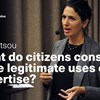consumer

Eri Bertsou: What do citizens consider to be politically legitimate uses of expertise?
Can democratic politics incorporate citizen demands for independent expertise in ways that boost legitimacy and trust in politics? Democratic governments worldwide face the dilemma of how to deal with
Deep learning diffusion by infusion into preexisting technologies - Implications for users and society at large
in: Technology in Society. 63, 101396 Abstract:Artificial Intelligence (AI) in the form of Deep Learning (DL) technology has diffused in the consumer domain in a unique way as compared to previous gene, i.e., by being added to preexisting technologies that are already in use. We find that DL-algorithms for recommendations or ranking have been infused into all the 15 most popular mobile applications (apps) in the U.S. (as of May 2019). DL-infusion enables fast and vast diffusion. For example, when a DL-system was infused into YouTube, it almost immediately reached a third of the world's population. We argue that existing theories of innovation diffusion and adoption have limited relevance for DL-infusion, because it is a process that is driven by enterprises rather than individuals. We also discuss its social and ethical implications. First, consumers have a limited ability to detect and evaluate an infused technology. DL-infusion may thus help to explain why AI's presence in society has not been challenged by many. Second, the DL-providers are likely to face conflicts of interest, since consumer and supplier goals are not always aligned. Third, infusion is likely to be a particularly important diffusion process for DL-technologies as compared to other innovations, because they need large data sets to function well, which can be drawn from preexisting users. Related, it seems that larger technology companies comparatively benefit more from DL-infusion, because they already have many users. This suggests that the value drawn from DL is likely to follow a Matthew Effect of accumulated advantage online: many preexisting users provide a lot of behavioral data, which bring about better DL-driven features, which attract even more users, etc. Such a self-reinforcing process could limit the possibilities for new companies to compete. This way, the notion of DL-infusion may put light on the power shift that comes with the presence of AI in society.
Eri Bertsou: Varieties of Expertise: What do citizens consider to be politically legitimate uses of expertise
Venue: Institutet för framtidsstudier, Holländargatan 13, 4th floor, Stockholm, and online Research seminar with Eri Bertsou, Assistant Professor of Political Science, University of St. Gallen (HSG).REG
Robert Goodin: Structures of Complicity
Structures of Complicity: Consumers, Producers, Suppliers with Professor Robert E. Goodin, Australian National University AbstractUnder certain circumstances, businesses and consumers might be morally
Life-style and self-rated global health in Sweden: A prospective analysis spanning three decades
Preventive Medicine ScienceDirect http://www.sciencedirect.com/science/article/pii/S0091743513003472 Abstract The article studies the relation between lifestyle and global self-rated health in the adult
Replies to “Can Consumption-Based Emissions Accounting Solve the Problem of Historical Emissions? Some Skeptical Remarks”
Ethics, Policy & Environment vol 25, no 3, 371–374 Introduction In ´Consumption-Baed Emissions Accounting and Historical Emissions´(Torpman, 2022), I argued that a move from production-based emissio
Perceptions of discrimination against Muslims. A study of formal complaints against public institutions in Sweden.
Journal of Ethnic and Migration Studies. Published online. doi.org/10.1080/1369183X.2018.1561250 Abstract While discrimination in the labour market, housing and consumer domains has been studied extensi
Never eat a Pigeon with a Pumpkin: a model for the emergence and fixation of unsupported beliefs
This work was presented at the Oxford Symposium on Food and Cookery 2023, and a shortened form of the paper is Chapter 30 in Food Rules and Rituals: Proceedings of the Oxford Symposium on Food and Coo
CANCELLED: Eli Cook: Choose Your Own Captivity: Choice Architects and the Analog Origins of Digital Capitalism
Venue: Holländargatan 13, Stockholm, or online Research seminar with Eli Cook, Associate Professor of History at the University of Haifa. Abstract Based on my forthcoming book with Penguin-Random House, seeks to redefine how we understand freedom and power in a choice-saturated world.

Ghost Platform: Generating the "Complex Image" of Data, Labour, and Logistics
This project aims to create a platform that makes visible the conflicts in transport logistics that are mostly being concealed from public view.








